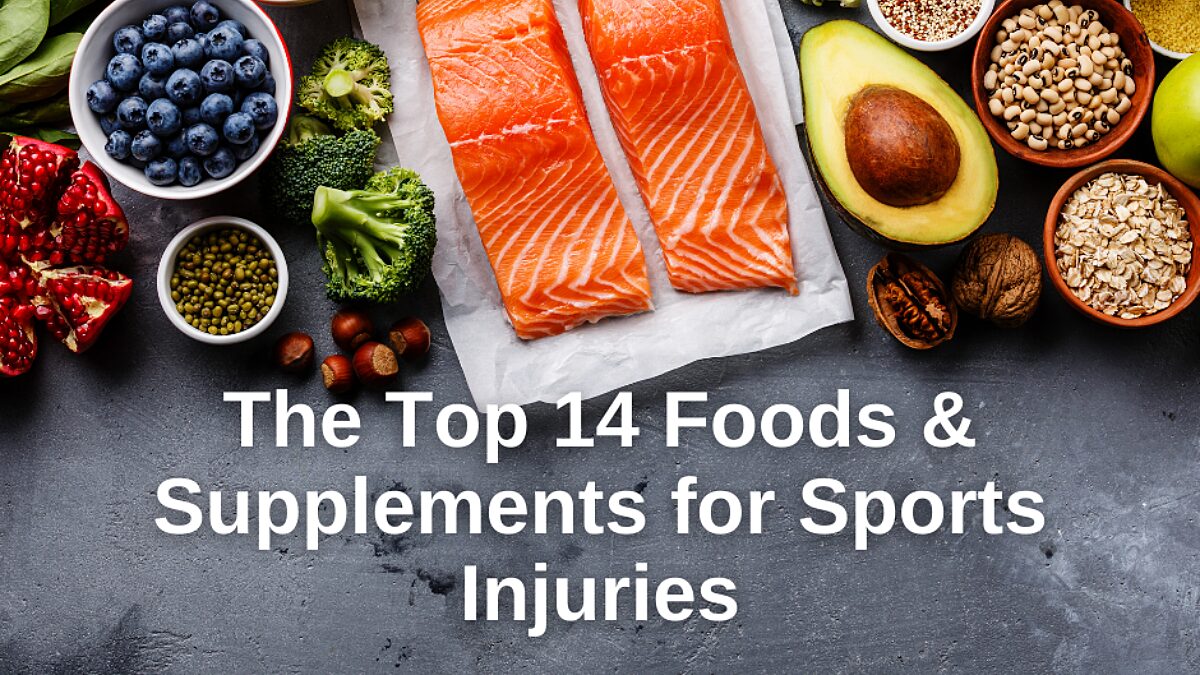
Recent Posts
When it comes to sports and athletics, injuries are an unfortunate part of the game. However, no one likes to be sidelined for longer than necessary. Fortunately, certain foods and supplements may help reduce the amount of time your body needs to recover from a sports injury.
While undergoing Physical Therapy, here are 14 foods and supplements you should consider adding to your diet to help recover from an injury more quickly.
1. Protein-Rich Foods
Protein is an important building block for many tissues in your body, including muscle.
After a sports injury, the injured body part is often immobilized. This generally leads to a decline in strength and muscle mass.
However, getting enough protein can help minimize this loss. Furthermore, a protein-rich diet may help prevent inflammation from getting too bad and slowing down your recovery. Moreover, slightly increasing your protein intake once you start training the injured body part again, or going to physical therapy helps you rebuild any lost muscle. For all these reasons, make sure to include protein-rich foods like meat, fish, poultry, tofu, beans, peas, nuts or seeds in your daily menu. How you distribute these foods throughout the day also seems to matter. Research shows that spreading your protein intake equally over four meals may stimulate muscle growth more than an uneven distribution.
2. Fiber-Rich Foods
Recovery from injury often involves immobilization or limited use of the injured body part.
To prevent this from resulting in unwanted body fat, it’s important to compensate by eating slightly less. One way to reduce your calorie intake is to consume a diet rich in fiber. This, along with consuming the protein-rich foods mentioned above, will help you eat less without feeling hungry. That’s because fiber-rich foods such as fruits, vegetables, legumes and whole grains help promote feelings of fullness after meals.
3. Fruits and Vegetables Rich in Vitamin C
Vitamin C helps your body make collagen, which helps maintain the integrity of your bones, muscles, skin and tendons. Therefore, getting enough vitamin C from your diet is a great way to help your body rebuild tissue after an injury. Moreover, vitamin C has antioxidant and anti-inflammatory properties, which may help speed up your recovery by preventing excessive levels of inflammation. Luckily, vitamin C is one of the easiest vitamins to get enough of through your diet.
Foods with the highest amounts of it include citrus fruits, red and yellow bell peppers, dark leafy greens, kiwi, broccoli, berries, tomatoes, mango and papaya.
4. Omega-3 Fatty Acids
After an injury, the first phase of wound healing always involves some inflammation. This inflammatory response is beneficial and needed for proper healing. However, if this inflammation remains too high for too long, it may slow down your recovery. One way to prevent excess inflammation from delaying your recovery is to eat enough omega-3 fats. These fats, which are found in foods such as fish, algae, walnuts, flaxseeds and chia seeds, are known to have anti-inflammatory properties. You can also prevent excess or prolonged inflammation by limiting omega-6 fats, which are commonly found in corn, canola, cottonseed, soy and sunflower oils.
Consuming too many omega-6 fats is known to promote inflammation, especially if your intake of omega-3 fats is also low.
5. Zinc-Rich Foods
Zinc is a component of many enzymes and proteins, including those needed for wound healing, tissue repair and growth. In fact, studies show that not getting enough zinc from your diet can delay wound healing.
Therefore, consuming zinc-rich foods such as meat, fish, shellfish, pulses, seeds, nuts and whole grains may help you recover more effectively from an injury.
6. Vitamin D and Calcium-Rich Foods
Calcium is an important component of bones and teeth. It’s also involved in muscle contractions and nerve signaling. That’s why it’s important to ensure you always get enough calcium — not just when you’re recovering from an injury.
Calcium-rich foods include dairy products, leafy greens, sardines, broccoli, okra, almonds, seaweed and calcium-fortified tofu and plant milks.
Vitamin D also serves an equally important function because it helps your body absorb the calcium found in the foods you eat. Together with calcium, it plays an instrumental role in recovering from a bone injury.
Also, getting enough vitamin D may increase the chances of a good recovery after surgery. For instance, studies have found a good vitamin D status can enhance strength recovery following an anterior cruciate ligament (ACL) surgery. Few foods naturally contain vitamin D, but your body has the ability to make vitamin D from exposure to the sun. Those living in northern climates or spending a limited amount of time outdoors may require supplements to get enough vitamin D.
7. Creatine
Creatine is a substance naturally found in meat, poultry and fish. It helps your body produce energy during heavy lifting or high-intensity exercise. The human body can also produce about 1 gram of it per day. Interestingly, it may also help you recover from an injury. It’s important to note that there is currently no consensus about creatine and sports injury recovery. That said, no studies to date have found any negative effects. Creatine remains one of the most-studied, safest supplements around, so it may be worth giving it a try.
8. Glucosamine
Glucosamine is a natural substance found in the fluid that surrounds your joints. It is involved in the creation of tendons, ligaments and cartilage.
Your body naturally produces glucosamine, but you can also increase your levels through supplements. Supplements are generally made either from shellfish shells or fermented corn. Research in individuals with arthritis shows that glucosamine may be useful in decreasing joint pain. One recent animal study also showed that taking glucosamine daily after a fracture may speed up bone reformation. Based on these findings, some people take glucosamine supplements to help reduce pain after joint and bone injuries or speed up recovery from fractures.
It’s worth noting that glucosamine supplements may pose a risk to those who are allergic or sensitive to shellfish or iodine, pregnant women and those with diabetes, high cholesterol, asthma or high blood pressure
9–14. Other Foods Beneficial for Bone Fractures
In addition to getting enough calcium and vitamin D, good intakes of the following nutrients can contribute to a speedier recovery from bone fractures
- Magnesium: Promotes bone strength and firmness. Found in almonds, cashews, peanuts, potato skins, brown rice, kidney beans, black-eyed peas, lentils and milk.
- Silicon: Plays an important role in the early stages of bone formation. Best sources include whole grains and cereals, carrots and green beans.
- Vitamins K1 and K2: Directs calcium toward bones and helps improve bone strength. Best sources include leafy greens, Brussels sprouts, prunes, sauerkraut, natto, miso, organ meats, egg yolks and dairy products from grass-fed cows.
- Boron: Promotes bone health by increasing calcium and magnesium retention and enhancing vitamin D’s effect. Prunes are the best dietary source.
- Inositol: Helps improve calcium absorption in bones. Found in cantaloupe, grapefruit, oranges and prunes.
- Arginine: This amino acid is needed to produce nitric oxide, a compound necessary for fracture healing. The best sources include meat, dairy, poultry, seafood, nuts and oatmeal.
Those recovering from bone fractures should consume foods rich in these nutrients daily.
**Sourced from Healthline. Read entire article HERE.
